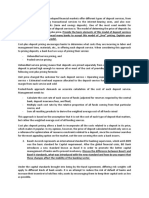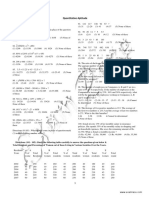0 ratings0% found this document useful (0 votes)
293 views2.1assignment Operator in C Programming Language
The document discusses various operators in C programming language including assignment, arithmetic, relational, logical, and conditional operators. It provides examples of using each operator type and explains their functionality. The assignment operator is used to assign values to variables. Arithmetic operators include addition, subtraction, multiplication, division, and modulo. Relational operators compare values, while logical operators combine conditional expressions. Conditional operators provide a short-hand ternary conditional expression.
Uploaded by
Rahul LavhandeCopyright
© © All Rights Reserved
Available Formats
Download as DOCX, PDF, TXT or read online on Scribd
0 ratings0% found this document useful (0 votes)
293 views2.1assignment Operator in C Programming Language
The document discusses various operators in C programming language including assignment, arithmetic, relational, logical, and conditional operators. It provides examples of using each operator type and explains their functionality. The assignment operator is used to assign values to variables. Arithmetic operators include addition, subtraction, multiplication, division, and modulo. Relational operators compare values, while logical operators combine conditional expressions. Conditional operators provide a short-hand ternary conditional expression.
Uploaded by
Rahul LavhandeCopyright
© © All Rights Reserved
Available Formats
Download as DOCX, PDF, TXT or read online on Scribd
You are on page 1/ 13
Assignment Operator in C Programming Language :
1. Assignment Operator is Used to Assign Value to a Variable.
2. Assignment Operator is Denoted by Equal to Sign , =.
3. Assignment Operator is Binary Operator i.e It Operates on Two Operands.
4. Assignment Operator have Two Values L-Value and R-Value.
5. Assignment Operator Copies R-Value into L-Value.
6. Assignment Operator have Lower Precedence than any Other Operator and Higher
Precedence than Comma Operator. [View this Precedence Table ]
Different Ways of Using Assignment Operator :
Way 1 : Assignment Operator used to Assign Value
#include<stdio.h>
int main()
{
int value;
value = 55;
return(0);
}
Way 2 : Assignment Operator used To Type Cast.
Assignment Operator can Type Cast Higher Values to Lower Values or Lower Values to
Higher Values
int value;
value = 55.450;
printf("%d",value);
Way 3 : Assignment Operator in If Statement
if(value = 10)
printf("True");
else
printf("False");
Arithmetic Operator in C Programming Language
1. C Programming Supports 5 Arithmetic Operators.
2. Arithmetic Operators are used for Arithmetic Calculation.
Supported Arithmetic Operators :
5 arithmetic operators are shown in the following table. Arithmetic operators are used to
perform arithmetic operations in c programming.
Operator Meaning Example
+ Addition Operator 10 + 20 = 30
- Subtraction Operator 20 10 = 10
* Multiplication Operator 20 * 10 = 200
/ Division Operator 20 / 10 = 2
% Modulo Operator 20 % 6 = 2
Live Example : C Program to Verify Arithmetic Operator
and Operation
#include <stdio.h>
int main()
{
int num1,num2;
int sum,sub,mult,div,mod;
printf("\nEnter First Number :");
scanf("%d",&num1);
printf("\nEnter Second Number :");
scanf("%d",&num2);
sum = num1 + num2;
printf("\nAddition is : %d",sum);
sub = num1 - num2;
printf("\nSubtraction is : %d",sub);
mult = num1 * num2;
printf("\nMultiplication is : %d",mult);
div = num1 / num2;
printf("\nDivision is : %d",div);
mod = num1 % num2;
printf("\nModulus is : %d",mod);
return(0);
}
Output :
Enter First Number : 10
Enter Second Number : 5
Addition is : 15
Subtraction is : 5
Multiplication is : 50
Division is : 2
Modulus is : 0
Precedence Power : Which Operator have Highest
Priority ?
If we consider all the arithmetic operators then we can say that Multiplication and division
operator have highest priority than addition and subtraction operator. Following table clearly
explains the priority of all arithmetic operators in C programming
Priority Rank Operator Description Operator Associativity
1 Multiplication * Left to Right
1 Division / Left to Right
1 Modulo % Left to Right
2 Addition + Left to Right
2 Subtraction - Left to Right
Increment Operator in C Programming :
1. Increment operator is used to increment the current value of variable by adding
integer 1.
2. Increment operator can be applied to only variables.
3. Increment operator is denoted by ++.
Different Types of Increment Operation :
In C Programming we have two types of increment operator i.e Pre-Increment and Post-
Increment Operator.
A. Pre Increment Operator in C Programming :
Pre-increment operator is used to increment the value of variable before using in the
expression. In the Pre-Increment value is first incremented and then used inside the
expression.
b = ++y;
In this example suppose the value of variable y is 5 then value of variable b will be 6
because the value of y gets modified before using it in a expression.
B. Post Increment Operator in C Programming :
Post-increment operator is used to increment the value of variable as soon as after executing
expression completely in which post increment is used. In the Post-Increment value is first
used in a expression and then incremented.
b = x++;
In this example suppose the value of variable x is 5 then value of variable b will be 5
because old value of x is used.
Live Program : C Program to Perform Increment
Operation in C Programming
#include<stdio.h>
void main()
{
int a,b,x=10,y=10;
a = x++;
b = ++y;
printf("Value of a : %d",a);
printf("Value of b : %d",b);
}
Output :
Value of a : 10
Value of b : 11
Tip #1 : Increment Operator should not be used on
Constants
We cannot use increment operator on the constant values because increment operator
operates on only variables. It increments the value of the variable by 1 and stores the
incremented value back to the variable,
b = ++5;
Or
b = 5++;
Decrement Operator in C Programming :
1. Decrement operator is used to decrease the current value of variable by subtracting
integer 1.
2. Like Increment operator, decrement operator can be applied to only variables.
3. Decrement operator is denoted by .
Different Types of Decrement Operation :
When decrement operator used in C Programming then it can be used as pre-decrement or
post-decrement operator.
A. Pre Decrement Operator in C Programming :
Pre-decrement operator is used to decrement the value of variable before using in the
expression. In the Pre-decrement value is first decremented and then used inside the
expression.
b = --var;
Suppose the value of variable var is 10 then we can say that value of variable var is firstly
decremented then updated value will be used in the expression.
B. Post Decrement Operator in C Programming :
Post-decrement operator is used to decrement the value of variable immediatly after
executing expression completely in which post decrement is used. In the Post-decrement old
value is first used in a expression and then old value will be decrement by 1.
b = var--;
Value of variable var is 5. Same value will be used in expression and after execution of
expression new value will be 4.
Live Program : C Program to Perform Decrement
Operation in C Programming
#include<stdio.h>
void main()
{
int a,b,x=10,y=10;
a = x--;
b = --y;
printf("Value of a : %d",a);
printf("Value of b : %d",b);
}
Output :
Value of a : 10
Value of b : 9
Tip #1 : Decrement Operator should not be used on
Constants
We cannot use decrement operator in the following case -
b = --5;
Or
b = 5--;
Relational Operator in C
In C Programming we can compare the value stored between two variables and depending on
the result we can follow different blocks using Relational Operator in C. In C we have
different relational operators such as -
Operator Meaning
> Greater than
>= Greater than or equal to
<= Less than or equal to
< Less than
Live Example of Relational Operator :
#include<stdio.h>
int main()
{
int num1 = 30;
int num2 = 40;
printf("Value of %d > %d is %d",num1,num2,num1> num2);
printf("Value of %d >=%d is %d",num1,num2,num1>=num2);
printf("Value of %d <=%d is %d",num1,num2,num1<=num2);
printf("Value of %d < %d is %d",num1,num2,num1< num2);
return(0);
}
Output :
Value of 30 > 40 is 0
Value of 30 >=40 is 0
Value of 30 <=40 is 1
Value of 30 < 40 is 1
We all know that C does not support boolean data type so in order to compare the equality we
use comparison operator or equality operator in C Programming.
Operator Meaning
== Is equal to
!= Is not equal to
Live Example Of Equality Operator in C
#include<stdio.h>
int main()
{
int num1 = 30;
int num2 = 40;
printf("Value of %d ==%d is %d",num1,num2,num1==num2);
printf("Value of %d !=%d is %d",num1,num2,num1!=num2);
return(0);
}
Output :
Value of 30 ==40 is 0
Value of 30 !=40 is 1
Logical Operator in C Programming
Whenever we use if statement then we can use relational operator which tells us the result of
the comparison, so if we want to compare more than one conditions then we need to use
logical operators. Suppose we need to execute certain block of code if and only if two
conditions are satisfied then we can use Logical Operator in C Programming.
Operator Name of the Operator
&& And Operator
|| Or Operator
! Not Operator
Let us look at all logical operators with example -
#include<stdio.h>
int main()
{
int num1 = 30;
int num2 = 40;
if(num1>=40 || num2>=40)
printf("Or If Block Gets Executed");
if(num1>=20 && num2>=20)
printf("And If Block Gets Executed");
if( !(num1>=40))
printf("Not If Block Gets Executed");
return(0);
}
Output :
Or If Block Gets Executed
And If Block Gets Executed
Not If Block Gets Executed
Explanation of the Program :
Suppose OR Operator is used inside if statement then if part will be executed if any of the
condition evaluated to be true.
if(num1>=40 || num2>=40)
In the above if statement first condition is false and second condition is true , so if part will be
executed.
if(num1>=20 && num2>=20)
In the above if statement both the conditions are true so if statement will be executed, AND
Operator will look for truthness of first condition, If it founds the true condition then it will
look for 2nd condition. If 2nd Condition founds to be true then it will look for next condition.
Logical Operator Chart :
Operator Applied Between Condition 1 Condition 2 Final Output
AND True True True
True False False
False True False
Operator Applied Between Condition 1 Condition 2 Final Output
False False False
OR True True True
True False True
False True True
False False False
NOT True - False
False - True
Conditional Operators [ ?: ] : Ternary Operator
Statement in C
1. They are also called as Ternary Operator .
2. They also called as ?: operator
3. Ternary Operators takes on 3 Arguments
Syntax :
expression 1 ? expression 2 : expression 3
where
expression1 is Condition
expression2 is Statement Followed if Condition is True
expression2 is Statement Followed if Condition is False
Conditional Statement in C Programming Lanuage
Meaning of Syntax :
1. Expression1 is nothing but Boolean Condition i.e it results into either TRUE or
FALSE
2. If result of expression1 is TRUE then expression2 is Executed
3. Expression1 is said to be TRUE if its result is NON-ZERO
4. If result of expression1 is FALSE then expression3 is Executed
5. Expression1 is said to be FALSE if its result is ZERO
Live Example : Check whether Number is Odd or Even
#include<stdio.h>
int main()
{
int num;
printf("Enter the Number : ");
scanf("%d",&num);
flag = ((num%2==0)?1:0);
if(flag==0)
printf("\nEven");
else
printf("\nOdd");
}
More Simply we can write this program as -
#include<stdio.h>
int main()
{
int num;
printf("Enter the Number : ");
scanf("%d",&num);
(num%2==0)?printf("Even"):printf("Odd");
}
Big Note : Ternary Operator
Operator that works on 3 operands is called as tertiary operator. Ternary operator . Read rules
of using Ternary Operator in C .
Comma Operator : Lowest Precedence | Returns Righmost
#include<stdio.h>
void main()
{
int a=1,b=2;
int k;
k = (a,b);
printf("%d",k);
}
1. Comma Operator has Lowest Precedence. [Priority] i.e evaluated at last .
2. Comma operator returns the value of the rightmost operand.
3. Comma Operator Can acts as -
o Operator : In the Expression
o Separator : Declaring Variable , In Function Call Parameter List
In the Above Example -
1 : Comma as Seperator
int a=1,b=2;
It can acts as Seperator in -
Function calls
Function definitions
Variable declarations
Enum declarations
2 : Comma as Operator
k = (a,b);
Different Typical Ways of Comma as Operator :
int a=1,b=2,c;
Way 1 :
c = (a,b);
c = Value Stores in b . = 2
Way 2 :
c = a,b;
c = Value Stores in a . = 1
Arrow (->) Operator : Accessing Structure members using
Pointer
In C Programming we use arrow operator to access structure member using the pointer
variable.
Syntax and Use of Arrow Operator :
struct student
{
char name[20],
int roll;
}*ptr;
Expalanation :
Whenever we declare structure variable then member can be accessed using the dot operator.
But when pointer to a structure is used then arrow operator is used.
struct student
{
char name[20],
int roll;
}std;
struct student
{
char name[20],
int roll;
}*ptr;
Access Structure Member Example 1 Example 2
Name is accessed using std.name ptr->name
Roll number is accessed using std.roll ptr->roll
C Programming Operator Precedence and Associativity
C Programming supports wide range of Operators . While
Solving the Expression we must follow some rules , Example :
while Solving the expression [ a + b *c ] , we should first
perform Multiplication Operation and then Addition . Similarly
in order to solve such complicated expression you should have
hands on Operator Precedence and Associativity of Operators.
Precedence of the Operator are Listed in the Following Table and
This Table is Summarized in decreasing Order of Priority i.e
Topmost Operator has Highest Priority and Bottommost
Operator has Lowest Priority.
Description Operator Associativity
Increment
Decrement
Negation
Unary Minus
++
!
-
R -> L
Sizeof sizeof
Multiplication
Division
Modulus
*
/
%
L -> R
Addition
Subtraction
+
-
L -> R
Shift Operator
<<
>>
L -> R
Less Than
Greater Than
Less Than and Equal to
Greater Than and Equal to
<
>
<=
>=
L -> R
Equal to
Not Equal To
==
!=
L -> R
Logical AND && L -> R
Logical OR || L -> R
Conditional ?: R -> L
Assignment
=
+=
-=
*=
/=
R -> L
Comma , L -> R
Notes :
You might also like
- English File 4e Pre Int Culture Reading Comp Answer KeyNo ratings yetEnglish File 4e Pre Int Culture Reading Comp Answer Key3 pages
- Pre Processor Directives and Operators in CNo ratings yetPre Processor Directives and Operators in C45 pages
- Input and Output Functions in C - 1622196378713No ratings yetInput and Output Functions in C - 162219637871312 pages
- C Programming Tutorials: N.V.Raja Sekhar ReddyNo ratings yetC Programming Tutorials: N.V.Raja Sekhar Reddy19 pages
- Lesson Plan: Operators in C ProgrammingNo ratings yetLesson Plan: Operators in C Programming21 pages
- Call by Value and Call by Reference in CNo ratings yetCall by Value and Call by Reference in C14 pages
- Dharmsinh Desai University, Nadiad: Faculty of Information ScienceNo ratings yetDharmsinh Desai University, Nadiad: Faculty of Information Science39 pages
- Programme Guide: Bachelor of Computer ApplicationsNo ratings yetProgramme Guide: Bachelor of Computer Applications38 pages
- Comparison of Various Cloud Simulators Available in The Cloud ComputingNo ratings yetComparison of Various Cloud Simulators Available in The Cloud Computing15 pages
- Unit 1 Programming in C and Primitive Data TypesNo ratings yetUnit 1 Programming in C and Primitive Data Types26 pages
- Dbms Architecture, Dbms Languages, Data IndependenceNo ratings yetDbms Architecture, Dbms Languages, Data Independence7 pages
- Set Theory: FC 01: Elementary Mathematics and Statistics Jaipuria Institute of Management LucknowNo ratings yetSet Theory: FC 01: Elementary Mathematics and Statistics Jaipuria Institute of Management Lucknow23 pages
- C Arrays and Pointers: - in Java, Pointers Are Easy To Deal WithNo ratings yetC Arrays and Pointers: - in Java, Pointers Are Easy To Deal With38 pages
- Easy C Programming Problems & Solution For BeginnersNo ratings yetEasy C Programming Problems & Solution For Beginners10 pages
- "Keypad and LCD Interfacing Using MicrocontrollerNo ratings yet"Keypad and LCD Interfacing Using Microcontroller23 pages
- Foe e Ue Sheg4: Oinond Mairdeiuning Hode, RunningNo ratings yetFoe e Ue Sheg4: Oinond Mairdeiuning Hode, Running3 pages
- 0rzbe Cslcian Ndaoid Fhchthare N Padel: - : Andeoid A N Cpenr ScaeoetatnshemNo ratings yet0rzbe Cslcian Ndaoid Fhchthare N Padel: - : Andeoid A N Cpenr Scaeoetatnshem3 pages
- .Lohat Is Bia Voda Ergdcun Dhe 3Vs Ig Oa: Caxgc.A Eacomk ÄsinesehallengaNo ratings yet.Lohat Is Bia Voda Ergdcun Dhe 3Vs Ig Oa: Caxgc.A Eacomk Äsinesehallenga2 pages
- Covleotooss Terent - Plothorm Oncl Longung Do Horm A Eiged ConpukNo ratings yetCovleotooss Terent - Plothorm Oncl Longung Do Horm A Eiged Conpuk4 pages
- Cgen-Thes: Q.2 Eaao Epeun Acoid Android DNo ratings yetCgen-Thes: Q.2 Eaao Epeun Acoid Android D4 pages
- Laeatogetle: 2 Cermpar Vemns 2evfei Ehniques D e T A I S Mdiuûal WhoNo ratings yetLaeatogetle: 2 Cermpar Vemns 2evfei Ehniques D e T A I S Mdiuûal Who4 pages
- Lineaglayout: Layout Are Buile Using A Hiesenchy ObNo ratings yetLineaglayout: Layout Are Buile Using A Hiesenchy Ob6 pages
- Androidanereot: .Tohad Slayoud Anoonpcun Neo LyotonoNo ratings yetAndroidanereot: .Tohad Slayoud Anoonpcun Neo Lyotono8 pages
- Vescnbe Iarela Fhalydiu Use Cause Lor Foiserte: Keka Applic CuionNo ratings yetVescnbe Iarela Fhalydiu Use Cause Lor Foiserte: Keka Applic Cuion4 pages
- .Rploo Soal Longuagedsi Oith Suble: Soapis Nlttocmk - Otecol ForNo ratings yet.Rploo Soal Longuagedsi Oith Suble: Soapis Nlttocmk - Otecol For3 pages
- 22nd - 25th Oct Consolidated - Seating - Plan - Morning - ShiftNo ratings yet22nd - 25th Oct Consolidated - Seating - Plan - Morning - Shift4 pages
- Blockchain: Research and Applications: Lodovica Marchesi, Michele Marchesi, Roberto Tonelli, Maria Ilaria LunesuNo ratings yetBlockchain: Research and Applications: Lodovica Marchesi, Michele Marchesi, Roberto Tonelli, Maria Ilaria Lunesu13 pages
- Underground Fire Protection Pipes & EquipmentsNo ratings yetUnderground Fire Protection Pipes & Equipments6 pages
- Target: Before Proceeding Further, Check How Much You Know About BusinessNo ratings yetTarget: Before Proceeding Further, Check How Much You Know About Business16 pages
- Unit - 4 Artificial Intelligence AssignmentNo ratings yetUnit - 4 Artificial Intelligence Assignment13 pages
- Brake Master Cylinder - Expansion Tank BMW E60 Sedan 47750No ratings yetBrake Master Cylinder - Expansion Tank BMW E60 Sedan 477502 pages
- Quantitative Aptitude Sample Paper 1 PDFNo ratings yetQuantitative Aptitude Sample Paper 1 PDF9 pages
- Typhoon Yolanda: An Analysis On The Impact of Natural Disasters and Effectiveness of Disaster ManagementNo ratings yetTyphoon Yolanda: An Analysis On The Impact of Natural Disasters and Effectiveness of Disaster Management7 pages
- Surface Area and Porosity Determinations by Physisorption: Measurement, Classical Theories and Quantum Theory 2Nd Edition James B. Condon - Ebook PDF100% (3)Surface Area and Porosity Determinations by Physisorption: Measurement, Classical Theories and Quantum Theory 2Nd Edition James B. Condon - Ebook PDF51 pages
- English File 4e Pre Int Culture Reading Comp Answer KeyEnglish File 4e Pre Int Culture Reading Comp Answer Key
- Dharmsinh Desai University, Nadiad: Faculty of Information ScienceDharmsinh Desai University, Nadiad: Faculty of Information Science
- Programme Guide: Bachelor of Computer ApplicationsProgramme Guide: Bachelor of Computer Applications
- Comparison of Various Cloud Simulators Available in The Cloud ComputingComparison of Various Cloud Simulators Available in The Cloud Computing
- Dbms Architecture, Dbms Languages, Data IndependenceDbms Architecture, Dbms Languages, Data Independence
- Set Theory: FC 01: Elementary Mathematics and Statistics Jaipuria Institute of Management LucknowSet Theory: FC 01: Elementary Mathematics and Statistics Jaipuria Institute of Management Lucknow
- C Arrays and Pointers: - in Java, Pointers Are Easy To Deal WithC Arrays and Pointers: - in Java, Pointers Are Easy To Deal With
- Easy C Programming Problems & Solution For BeginnersEasy C Programming Problems & Solution For Beginners
- 0rzbe Cslcian Ndaoid Fhchthare N Padel: - : Andeoid A N Cpenr Scaeoetatnshem0rzbe Cslcian Ndaoid Fhchthare N Padel: - : Andeoid A N Cpenr Scaeoetatnshem
- .Lohat Is Bia Voda Ergdcun Dhe 3Vs Ig Oa: Caxgc.A Eacomk Äsinesehallenga.Lohat Is Bia Voda Ergdcun Dhe 3Vs Ig Oa: Caxgc.A Eacomk Äsinesehallenga
- Covleotooss Terent - Plothorm Oncl Longung Do Horm A Eiged ConpukCovleotooss Terent - Plothorm Oncl Longung Do Horm A Eiged Conpuk
- Laeatogetle: 2 Cermpar Vemns 2evfei Ehniques D e T A I S Mdiuûal WhoLaeatogetle: 2 Cermpar Vemns 2evfei Ehniques D e T A I S Mdiuûal Who
- Lineaglayout: Layout Are Buile Using A Hiesenchy ObLineaglayout: Layout Are Buile Using A Hiesenchy Ob
- Androidanereot: .Tohad Slayoud Anoonpcun Neo LyotonoAndroidanereot: .Tohad Slayoud Anoonpcun Neo Lyotono
- Vescnbe Iarela Fhalydiu Use Cause Lor Foiserte: Keka Applic CuionVescnbe Iarela Fhalydiu Use Cause Lor Foiserte: Keka Applic Cuion
- .Rploo Soal Longuagedsi Oith Suble: Soapis Nlttocmk - Otecol For.Rploo Soal Longuagedsi Oith Suble: Soapis Nlttocmk - Otecol For
- 22nd - 25th Oct Consolidated - Seating - Plan - Morning - Shift22nd - 25th Oct Consolidated - Seating - Plan - Morning - Shift
- Blockchain: Research and Applications: Lodovica Marchesi, Michele Marchesi, Roberto Tonelli, Maria Ilaria LunesuBlockchain: Research and Applications: Lodovica Marchesi, Michele Marchesi, Roberto Tonelli, Maria Ilaria Lunesu
- Target: Before Proceeding Further, Check How Much You Know About BusinessTarget: Before Proceeding Further, Check How Much You Know About Business
- Brake Master Cylinder - Expansion Tank BMW E60 Sedan 47750Brake Master Cylinder - Expansion Tank BMW E60 Sedan 47750
- Typhoon Yolanda: An Analysis On The Impact of Natural Disasters and Effectiveness of Disaster ManagementTyphoon Yolanda: An Analysis On The Impact of Natural Disasters and Effectiveness of Disaster Management
- Surface Area and Porosity Determinations by Physisorption: Measurement, Classical Theories and Quantum Theory 2Nd Edition James B. Condon - Ebook PDFSurface Area and Porosity Determinations by Physisorption: Measurement, Classical Theories and Quantum Theory 2Nd Edition James B. Condon - Ebook PDF



















































































































